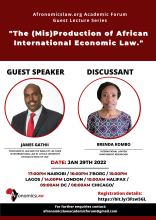It is accepted that legal doctrine is a normative discipline, which is not only describing and systematising norms, but also predominantly a discipline which takes normative positions and makes choices among values and interests. Consequently, the quest to find “better law” by adopting certain interpretative or normative positions often leads to elements external to law and legal doctrine such as philosophy, morals, history, sociology, economy, and politics. Hence, looking for better law involves empirical research particularly as better, in the context of this post, refers to a historical and sociological perspective on the balancing of the Eurocentric make-up of international law. Thus, the teaching of precolonial African trade usages should be explicitly embedded into the public international law (and international trade law) curriculum in Nigerian universities. This has already been done in international relations programmes in some Nigerian universities.
